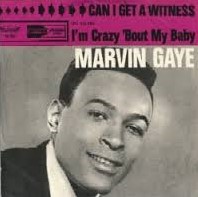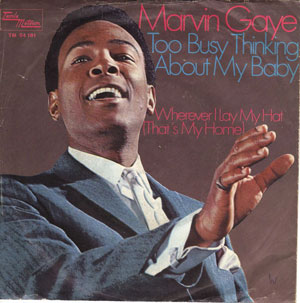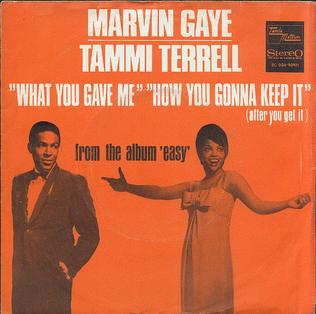
Martha and the Vandellas were an American vocal girl group formed in Detroit in 1957. The group achieved fame in the 1960s with Motown.

"You're All I Need to Get By" is a song recorded by the American R&B/soul duo Marvin Gaye and Tammi Terrell and released on Motown Records' Tamla label in 1968. It was the basis for the 1995 single "I'll Be There for You/You're All I Need to Get By" from Method Man and Mary J. Blige.
"Hitch Hike" is a 1962 song by Marvin Gaye, released on the Tamla label. Another song Gaye co-wrote.

"Dancing in the Street" is a song written by Marvin Gaye, William "Mickey" Stevenson and Ivy Jo Hunter. It first became popular in 1964 when recorded by Martha and the Vandellas whose version reached No. 2 on the Billboard Hot 100 chart and peaked at No. 4 in the UK Singles Chart. It is one of Motown's signature songs and is the group's premier signature song. A 1966 cover by the Mamas & the Papas was a minor hit on the Hot 100 reaching No. 73. In 1982, the rock group Van Halen took their cover of "Dancing in the Street" to No. 38 on the Hot 100 chart and No. 15 in Canada on the RPM chart. A 1985 duet cover by David Bowie and Mick Jagger charted at No. 1 in the UK and reached No. 7 in the US. The song has been covered by many other artists, including The Kinks, Tages, Black Oak Arkansas, Grateful Dead, Little Richard, Myra and Karen Carpenter.

"Can I Get a Witness" is a song composed by Brian Holland, Lamont Dozier, and Eddie Holland and produced by Brian Holland and Lamont Dozier as a non-album single for American recording vocalist Marvin Gaye, who issued the record on Motown's Tamla imprint in September 1963.

"Too Busy Thinking About My Baby" is a Motown song written by Norman Whitfield, Barrett Strong, and Janie Bradford. The song was first recorded by The Temptations as a track on their 1966 album Gettin' Ready. Eddie Kendricks sings lead on the recording, which was produced by Whitfield. Jimmy Ruffin also recorded a version with The Temptations providing background vocals in 1966. It remained unreleased until 1997.
"Stubborn Kind of Fellow" is a 1962 song recorded by Marvin Gaye for the Tamla label. Co-written by Gaye and produced by William "Mickey" Stevenson, "Stubborn Kind of Fellow" became Gaye's first hit single, reaching the top 10 of the R&B chart and the top 50 of the Billboard Hot 100 in late 1962.

That Stubborn Kinda Fellow is the second studio album by Marvin Gaye, released on the Tamla label in 1963. The second LP Gaye released on the label, it also produced his first batch of successful singles for the label and established Gaye as one of the label's first hit-making acts in its early years.

"Heat Wave" is a 1963 song written by the Holland–Dozier–Holland songwriting team. It was first made popular by the Motown vocal group Martha and the Vandellas. Released as a 45 rpm single on July 9, 1963, on the Motown subsidiary Gordy label, it hit number one on the Billboard Hot R&B chart—where it stayed for four weeks—and peaking at number 4 on the Billboard Hot 100.
"Come and Get These Memories" is an R&B song by Motown girl group Martha and the Vandellas. Their second single released under Motown's Gordy Records subsidiary, "Memories" became the group's first hit single, reaching number 29 on the Billboard Pop Singles Chart, and number-six on the Billboard R&B Singles Chart.

"Jimmy Mack" is a pop/soul song that in 1967 became a hit single by Martha and the Vandellas for Motown's Gordy imprint. Written and produced by Motown's main creative team, Holland–Dozier–Holland, "Jimmy Mack" was the final Top 10 pop hit for the Vandellas in the United States, peaking at No.10 on the Billboard Hot 100 in 1967 and at No.1 on the Billboard R&B Singles chart. Billboard named the song No.82 on their list of 100 Greatest Girl Group Songs of All Time.
"Love Bug Leave My Heart Alone" is a 1967 single released by Motown girl group Martha and the Vandellas. The song's production was a departure from the Vandellas' repertoire as their label, Motown, was having a harder time staying with the times in the music industry and having a much harder time finding a hit for its acts after several departures including Vandellas collaborators William "Mickey" Stevenson and Holland-Dozier-Holland, who produced the b-side to this single, "One Way Out", one of the trio's final recordings with the Vandellas. Produced by Richard Morris, the song displayed of the narrator wanting "the love bug" to leave her alone so she won't "fall in love". The narrator, lead singer Martha Reeves, was left heart-broken the last time she allowed the man to come back to her but after suffering heartbreak, she expresses her disgust at the man's attempts, with her fellow members Rosalind Ashford and Betty Kelley chanting "get outta there, love bug, leave my heart alone". The song was their second consecutive Top 40 single of 1967 peaking at number twenty-five on the Billboard pop singles chart and number fourteen on the Billboard Hot R&B singles chart. The record was the first track ever played on UK Radio One by DJ John Peel.

Greatest Hits is a 1964 greatest hits album, the first for American R&B-soul singer Marvin Gaye, released on the Tamla label. Released during Gaye's first period of success, it was also his first charted album as a solo artist after making his album chart debut with the Mary Wells duet album, Together, the same year.
"Pretty Little Baby" is a 1965 single released by soul singer Marvin Gaye on the Tamla label.
"You" is a 1967 single released by American singer Marvin Gaye on the Tamla label.

"Beechwood 4-5789" is a song written by Marvin Gaye, William "Mickey" Stevenson and George Gordy. It was a 1962 hit single for the Motown girl group The Marvelettes on Motown's Tamla subsidiary record label. The song became a hit again when it was covered by the pop duo The Carpenters in 1982.

"What You Gave Me" is a hit duet written and produced by Ashford & Simpson and issued as a single originally by the vocal duo of Marvin Gaye and Tammi Terrell in 1969 on the Tamla label.
"The Bells" is a 1970 single recorded by The Originals for Motown's Soul label, produced by Marvin Gaye and co-written by Gaye, his wife Anna Gordy Gaye, Iris Gordy, and Elgie Stover.

"Gonna Give Her All the Love I've Got" is a 1967 Soul song, originally recorded and made a hit by Jimmy Ruffin on Motown's Soul Label imprint. Ruffin's 1967 original version, from his album Jimmy Ruffin Sings Top Ten, reached the Pop Top 30, peaking at #29, and was a Top 20 R&B Hit as well, peaking at #14. It was also a hit in Britain, reaching #26 on the UK Singles Chart. The song has a social context: it depicts a man anticipating his release from prison on the morrow, when he'll return home on a train to "the girl that I left behind," promising himself that he will reward her steadfast love for him by "giv[ing] her all the love [he's] got." The song was written by Norman Whitfield and Barrett Strong and produced by Whitfield.
Billboard year-end top 50 R&B singles of 1963 is the year-end chart compiled by Billboard magazine ranking the top rhythm and blues singles of 1963. The list was based on charts from the January 6 through the November 23 issues.












